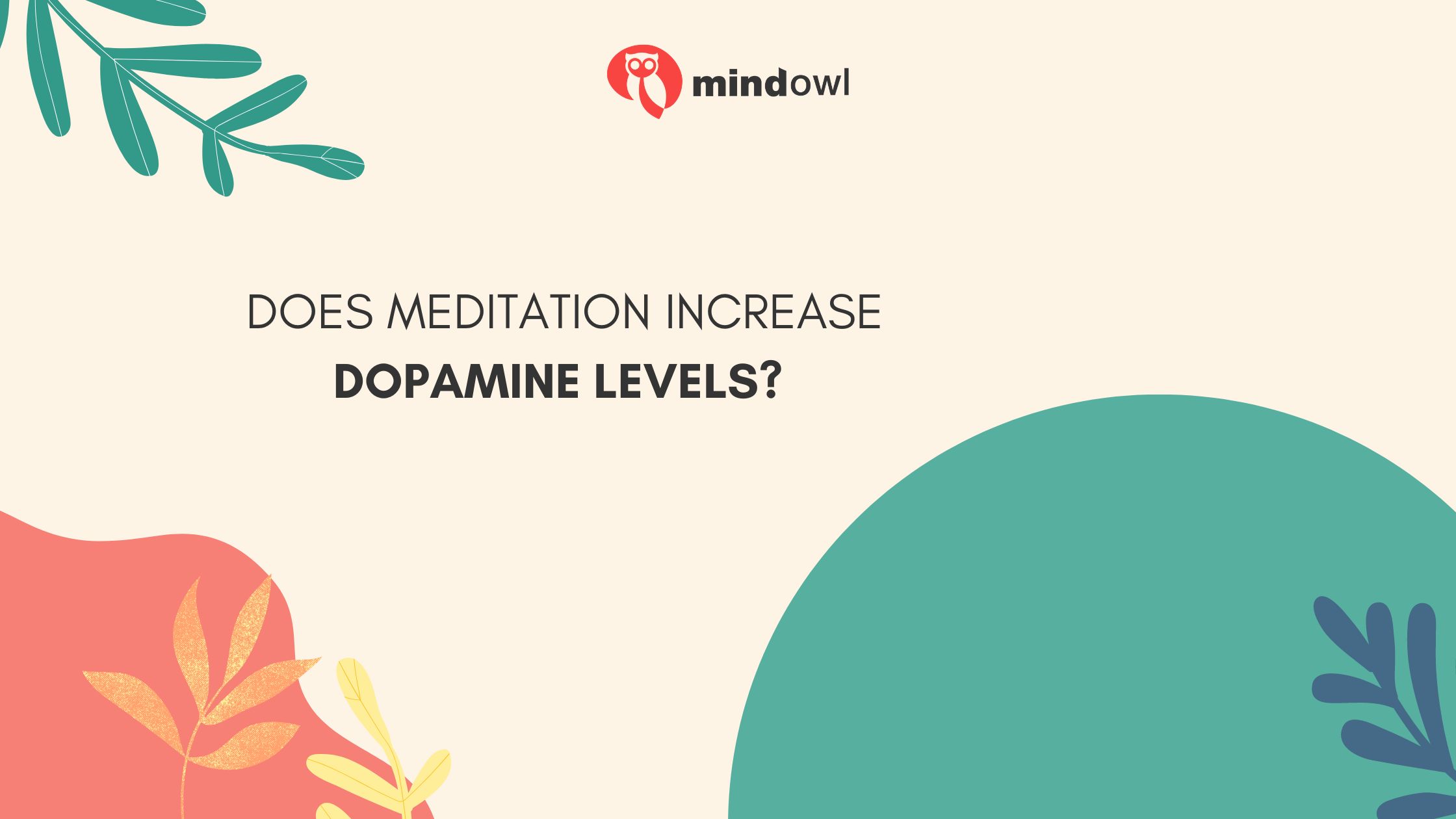Meditation has long been practised for its ability to promote relaxation, reduce stress, and enhance overall well-being. In recent years, scientists have begun to uncover how meditation influences neurotransmitters in the brain, with particular attention paid to dopamine. Dopamine plays a key role in the brain’s reward and motivation system, helping to regulate movement, attention, learning, and emotional responses.
Studies suggest that meditation can increase dopamine levels in the brain. One notable study found a 65% increase in dopamine release during Yoga Nidra meditation, which correlated with the meditators’ reported decreased desire for action. Other research points to increased dopamine tone and beneficial changes in dopamine receptors in the brains of regular meditators.
This article will explore the current scientific evidence regarding meditation’s impact on the dopamine system and discuss the implications of this research for understanding the neurobiological mechanisms behind meditation’s effects on mental health and cognition.
Key Takeaways
- Dopamine is a neurotransmitter that plays a crucial role in our brain and behaviour, affecting how we feel day to day.
- Scientific research suggests that meditation can increase dopamine levels in the brain, leading to feelings of calmness and happiness.
- Regular mindfulness practice can help keep the brain filled with these feel-good chemicals and have a positive impact on overall health.
- Meditation also has other beneficial effects on the brain, such as increasing grey matter density, reducing cortisol levels (a stress hormone), and improving overall brain function.

Understanding Dopamine
What is dopamine?
Dopamine is a neurotransmitter and hormone produced in the brain that acts as a chemical messenger between nerve cells. It is made in the substantia nigra, ventral tegmental area, and hypothalamus. Dopamine plays a crucial role in the brain’s reward and motivation system. When we do something pleasurable, like eating good food or having sex, dopamine is released, reinforcing the behaviour and making us want to repeat it. This reward pathway can also lead to addictive behaviours and substance abuse.
In addition to its role in pleasure and reward, dopamine is involved in many other important functions. It helps regulate movement, attention, learning, and emotional responses. Dopamine also influences lactation, sleep, mood, and pain processing. Imbalances in dopamine levels are linked to several neurological and psychiatric disorders.
How does it affect our brain and behaviour?
Dopamine is a strong player in our brains. It helps run many key jobs. Dopamine is like a messenger in our brain, telling each part what to do next. This can change how we act and feel.
For example, it plays a big role in how we decide joy from things around us. We might smile at a fun joke or feel happy when we win a game because of dopamine’s work! If the body’s dopamine levels go up, you may want to get moving and not sit still.
Also, changes in this part of the brain can lead to diseases of the nervous system if dopamine does not work right.
The Role of Meditation in Brain Chemistry

How meditation affects dopamine levels
Meditation has been shown to influence dopamine activity in the brain, which may help explain some of its beneficial effects on mental health and well-being. Several studies have found changes in dopamine levels and dopamine receptors associated with meditation practice.
One notable study published in 2002 found a 65% increase in dopamine release in the ventral striatum during Yoga Nidra meditation. This increase correlated with the meditators’ reported decreased desire for action. The researchers suggested that meditation may stimulate dopamine release, leading to feelings of calm and reduced readiness for action.
Another study using positron emission tomography (PET) found increased dopamine tone in the ventral striatum of experienced meditators compared to non-meditators. Dopamine tone refers to the background level of dopamine activity, which may influence how reactive the system is to additional dopamine release. The study also found reduced dopamine availability in the thalamus, interpreted as increased dopamine release during meditation.
Other research has pointed to changes in dopamine receptors with meditation practice. One study found increased dopamine D2/D3 receptor availability in the striatum of experienced meditators. D2 receptors are involved in regulating dopamine activity and have been implicated in addiction and impulsivity. Increased D2 receptor availability may help reduce impulsive behaviour and cravings.
Meditation has also been associated with changes in brain structure and function in regions heavily innervated by dopamine, such as the prefrontal cortex and striatum. These changes may reflect altered dopamine signalling and could underlie some of meditation’s cognitive and emotional benefits.
Sources:
- Kjaer et al. (2002) – Increased dopamine tone during meditation-induced change of consciousness
https://pubmed.ncbi.nlm.nih.gov/11958969/
https://www.sciencedirect.com/science/article/abs/pii/S0926641001001069 - Lou et al. (1999) – A 15O-H2O PET study of meditation and the resting state of normal consciousness
https://pubmed.ncbi.nlm.nih.gov/9950067/
Other Beneficial Effects of Meditation on the Brain
Increased grey matter density
Meditation can lead to more grey matter in the brain. Grey matter is key for processing information and making choices. Neuroimaging studies back this up. They show that people who meditate often have bigger amounts of grey matter.
The change happens in different parts of the brain too, like the brain stem. A certain type of meditation called Rajyoga even alters grey matter volume related to rewards! So, regular mindful breathing or quiet sitting not only relaxes but also changes your brain in a positive way.
Reduced cortisol levels
Meditation helps to lower cortisol levels. High cortisol is a sign of stress. So, less cortisol means less stress. Mindfulness meditation is very good for this. It makes you think about now and not worry about other things.
This can help to bring down the amount of cortisol in your body. In fact, Transcendental meditation does this too! The way our brain works during meditation can also control how much cortisol we make.
Improved overall brain function
Meditation does more than just calm your mind. It can make your brain work better too. When you meditate, it can lead to changes in how your brain works and thinks. This helps to improve how well you think and remember things.
Mindfulness meditation has a big impact on the brain. It can change how the brain is shaped and how it works! Over time, regular meditators may find that they have a better mood and are awake more often.
Common Ways to Increase Dopamine Levels
Eating protein-rich foods
Protein-rich foods can increase dopamine production in the brain. Here are some examples of protein-rich foods that can help boost dopamine levels:
- Fish: Fish, such as salmon and tuna, are not only a great source of protein but also contain omega-3 fatty acids that support brain health.
- Poultry: Chicken and turkey are lean sources of protein that can help increase dopamine levels without adding excessive fat.
- Eggs: Eggs are rich in tyrosine, an amino acid that plays a critical role in dopamine production.
- Lean meats: Lean cuts of beef and pork provide high-quality protein and tyrosine, making them beneficial for dopamine production.
- Dairy products: Milk, cheese, and yogurt contain both protein and tyrosine, promoting dopamine synthesis.
Getting enough sleep and exercise
Getting enough sleep and exercise can help increase dopamine levels. Here are some ways to do it:
- Get at least 8 hours of sleep every night.
- Engage in physical activities like walking, jogging, or playing sports.
- Exercise regularly to improve your mood and potentially boost dopamine levels.
Listening to music
Listening to music can have a positive effect on dopamine levels in the brain. When we listen to music that we enjoy, it stimulates the release of dopamine, which is a neurotransmitter associated with pleasure and reward.
Several studies have found that listening to music can increase dopamine levels and trigger feelings of pleasure. In fact, when a person listens to music that gives them chills or goosebumps, it specifically activates the brain’s reward system and releases dopamine.
Taking supplements
Supplements can help increase dopamine levels in the brain. Here are some common supplements that may boost dopamine production:
- L-Tyrosine: This amino acid is a precursor to dopamine and can enhance its production.
- Mucuna pruriens: Also known as velvet bean, it contains a natural source of L-DOPA, which can be converted into dopamine.
- Curcumin: This compound found in turmeric has been shown to increase dopamine levels and improve brain function.
- Vitamin B6: This essential vitamin plays a crucial role in dopamine synthesis.
- Magnesium: It is involved in neurotransmitter release, including dopamine.
- Omega-3 fatty acids: Contained in fish oil supplements, such as DMoose Omega 3 Fish Oil, these compounds are associated with heightened dopamine receptor density, indicating potential cognitive benefits.
- Nootropics: Many of these supplements, such as L-Theanine, L-Tyrosine, and Citicoline, can increase dopamine levels and boost brain function. You could use nootropics for memory, increased focus, motivation, clear thinking, and a bright mood.
Frequently Asked Questions about Dopamine
Symptoms of low dopamine levels
Low dopamine levels can lead to various symptoms that affect both our mental and physical well-being. Some common signs of low dopamine include anxiety, moodiness, depression, and feelings of hopelessness.
Additionally, individuals with low dopamine may experience difficulties with concentration, coordination, and motivation. These symptoms can have a significant impact on daily life and overall quality of life.
If you notice these symptoms, it is important to consult with a healthcare professional for proper evaluation and guidance.
Triggers for dopamine release
Certain activities and behaviours can trigger the release of dopamine in our brains. One common trigger is when we experience something pleasurable or rewarding, like eating delicious food or receiving praise for a job well done.
Exercise and physical activity also increase dopamine levels, which is why many people feel happier after working out. Additionally, engaging in creative pursuits like painting or playing music can stimulate dopamine production.
Novelty and excitement can also cause a spike in dopamine, such as trying new experiences or taking risks. These triggers help explain why certain activities make us feel good and encourage us to seek them out again.
Relationship between ADHD and dopamine
ADHD, or attention deficit hyperactivity disorder, is a condition that affects the brain and behavior. One important factor in ADHD is dopamine, a chemical in the brain that helps regulate our attention and focus.
People with ADHD may have lower levels of dopamine compared to individuals without the condition. This can make it harder for them to maintain attention and concentrate on tasks. Some research suggests that dysfunction in dopamine transmission may be an underlying cause of ADHD.
Foods that increase dopamine levels
Certain foods can help increase dopamine levels in the brain, promoting feelings of pleasure and reward. Here are some examples:
- Foods high in protein: Eating protein-rich foods like cheese, soybeans, beef, lamb, pork, fish, chicken, nuts, eggs, dairy, beans, and whole grains can contribute to dopamine production.
- Probiotics: Consuming probiotics found in fermented foods like yogurt and kefir can naturally raise dopamine levels.
- Velvet beans: These beans are rich in dopamine precursors and can help increase dopamine levels.
- Foods high in tyrosine: Tyrosine is an amino acid that is important for dopamine synthesis. Foods like cheese, soybeans, beef, lamb, pork, fish, chicken, nuts, eggs,
Conclusion:
In conclusion, the current scientific evidence suggests that meditation, particularly practices like Yoga Nidra, can indeed influence dopamine levels in the brain. Brain imaging studies have found increased dopamine release and changes in dopamine receptor availability associated with meditation. These findings provide a neurochemical basis for some of the reported benefits of meditation, such as improved mood, reduced stress and anxiety, and better emotional regulation.
However, it’s important to note that the relationship between meditation and dopamine is complex and not yet fully understood. More research is needed to clarify the specific mechanisms by which different types of meditation influence the dopamine system, as well as the long-term effects of regular practice.
FAQs
1. Does meditation really increase dopamine levels in the brain?
Yes, research shows that people who meditate regularly may see an increase in dopamine levels.
2. What is the effect of meditation on the prefrontal cortex?
Meditation has a positive effect on the brain regions like the prefrontal cortex which takes care of executive control of our actions.
3. Can we use natural ways like meditation to produce dopamine without any side effects?
Indeed! Buddhist Meditation provides feedback resulting in the enhancement of neurotransmitter dopamine and serotonin levels without causing anxiety or depression.
4. How is endogenous neurotransmitter release linked with meditation?
The act of meditating can lead to states of consciousness that are associated with increased endogenous neurotransmitter release, such as dopamine, also known as ‘chemistry messenger’.
5. Is there any connection between the ventral striatum and mediation?
Yes, studies found out areas like the ventral striatum are active during meditation due to its influence over the nucleus accumbens which manages our desire for action hence providing a sense of gratification.
6. Can an adequate level sleep help maintain normal rates of respiration and heart rate while practicing regular medication?
Sleep is vitally important for maintaining optimal health; however, more detailed research is needed to establish how it directly influences factors such as respiration and heart rate during medication.
MindOwl Founder – My own struggles in life have led me to this path of understanding the human condition. I graduated with a bachelor’s degree in philosophy before completing a master’s degree in psychology at Regent’s University London. I then completed a postgraduate diploma in philosophical counselling before being trained in ACT (Acceptance and commitment therapy).
I’ve spent the last eight years studying the encounter of meditative practices with modern psychology.

